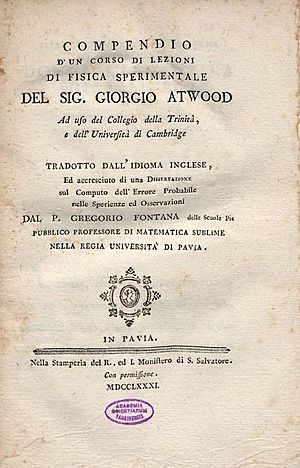George Atwood facts for kids
George Atwood (born around October 1745 – died July 11, 1807) was a clever English mathematician. He invented the Atwood machine. This machine helps show how Newton's laws of motion work. Atwood was also a very skilled chess player. He carefully recorded many chess games. These included games by the top player of his time, François-André Danican Philidor. His records are a valuable part of chess history.
Contents
Who Was George Atwood?
Early Life and Education
George Atwood was born in Westminster, England. We don't know his exact birth date. But we know he was baptized on October 15, 1745. He went to Westminster School. In 1765, he started studying at Trinity College, Cambridge.
He finished his studies in 1769. He was a top student, ranking third in his class. He also won the very first Smith's Prize. After graduating, he became a fellow and a teacher at the college. In 1776, he was chosen to be a member of the Royal Society of London. This is a famous group for scientists.
A New Career Path
In 1784, Atwood left Cambridge. Soon after, he got a job from William Pitt the Younger. Pitt was the Prime Minister of Great Britain. Atwood's new job was "patent searcher of the customs." This job didn't need much of his time. This meant he could spend a lot of time on his favorite subjects: mathematics and physics.
His Legacy
Atwood never married. He died in Westminster when he was 61 years old. He was buried at St. Margaret's Church. More than 100 years later, a lunar crater was named Atwood in his honor. This shows how important his work was.
Atwood's Amazing Machine
George Atwood is best known for inventing the Atwood machine. This device is used to teach about motion. It helps students see how forces make objects speed up or slow down. It's a simple but very effective tool. It shows how Newton's laws of motion work in real life.
A Master of Chess
Besides his scientific work, George Atwood was a very good chess player. He played against some of the best players of his time. He was even one of the few players who could sometimes beat Verdoni, another strong master.
Recording History
Atwood did something very special for chess history. He kept detailed records of many games. These included his own games and games played by others. He even recorded games played by François-André Danican Philidor. Philidor was considered the best chess player of that era. These records are very important. They let us study how chess was played hundreds of years ago.
His Published Works
Atwood wrote many important books and papers. Some of his works were published in the Philosophical Transactions. He even won the Copley Medal for one of these papers.
Here are some of his main published works:
- Analysis of a Course of Lectures on the Principles of Natural Philosophy (Cambridge, 1784). This book explained his lectures on natural philosophy.
- Treatise on the Rectilinear Motion and Rotation of Bodies (Cambridge, 1784). This book described interesting experiments. These experiments helped show mechanical truths clearly. It also explained the Atwood machine. This machine was used to test the rules of how things speed up.
- Review of the Statutes and Ordinances of Assize which have been established in England from the 4th year of King John, 1202, to the 37th of his present Majesty (London, 1801). This was a historical study about old English laws.
- Dissertation on the Construction and Properties of Arches (London, 1801). This book was about how arches are built and how they work.
- His chess game records were published after he died. George Walker published them in London in 1835. The book was called Selection of Games at Chess, actually played by Philidor and his Contemporaries.
 | Lonnie Johnson |
 | Granville Woods |
 | Lewis Howard Latimer |
 | James West |


